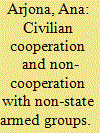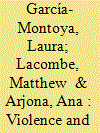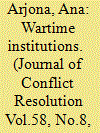| Srl | Item |
| 1 |
ID:
153613


|
|
|
|
|
| Summary/Abstract |
Terms like ‘support’ and ‘collaboration’ are often used interchangeably to denote a loose set of acts or attitudes that benefit non-state armed groups (NSAGs). However, these terms are seldom defined, and the alternatives available to civilians are rarely identified. Moreover, existing approaches overlook that the interaction between civilians and NSAGs is often one between ruler and ruled, which makes obedience and resistance central. This paper proposes to conceptualize the choices available to civilians as forms of cooperation and non-cooperation, offers a typology, and discusses the implications for theory building on civilian and NSAG behavior, and on the functioning of armed social orders.
|
|
|
|
|
|
|
|
|
|
|
|
|
|
|
|
| 2 |
ID:
186683


|
|
|
|
|
| Summary/Abstract |
How do citizens change their voting decisions after their communities experience catastrophic violent events? The literature on the behavioral effects of violence, on the one hand, and on political behavior, on the other, suggest different answers to this question. Using a difference-in-differences approach, we investigate the influence of indiscriminate, rampage-style school shootings on both voter turnout levels and the relative electoral support for the Democratic and Republican Parties at the county level in US presidential elections (1980–2016). We find that although voter turnout does not change, the vote share of the Democratic Party increases by an average of nearly 5 percentage points in counties that experienced shootings—a remarkable shift in an age of partisan polarization and close presidential elections. These results show that school shootings do have important electoral consequences and bring to the fore the need to further examine the effects of different forms of violence on political behavior.
|
|
|
|
|
|
|
|
|
|
|
|
|
|
|
|
| 3 |
ID:
134941


|
|
|
|
|
| Summary/Abstract |
Theories of civil war usually theorize the choices of civilians and combatants without considering the institutional context in which they interact. Despite common depictions of war as chaotic and anarchic, order often emerges locally. Institutions vary greatly over time and space and, as in peacetime, shape behavior. In this article, I propose a research agenda on local wartime institutions. To this end, I present original evidence on conflict areas in Colombia to illustrate the scope of variation, propose the concept of wartime social order and a typology, and discuss several ways in which research on wartime institutions can contribute to our study of civil war both at the micro and macro levels.
|
|
|
|
|
|
|
|
|
|
|
|
|
|
|
|